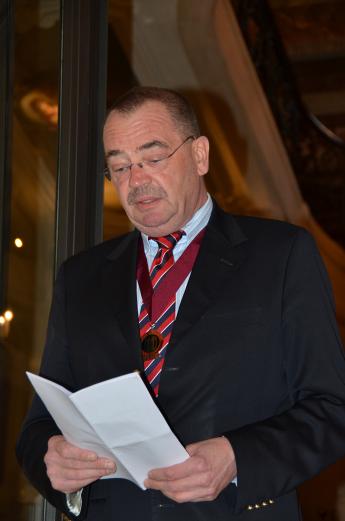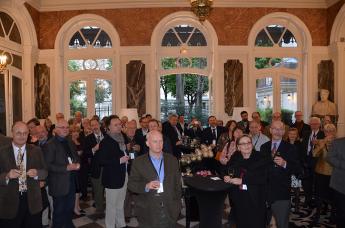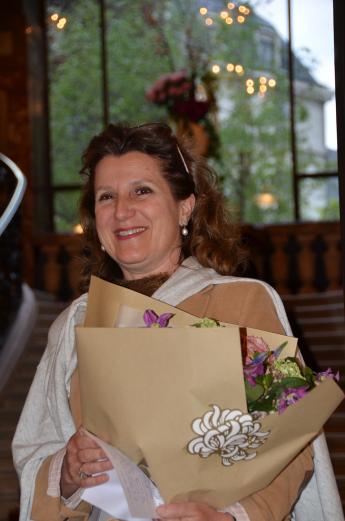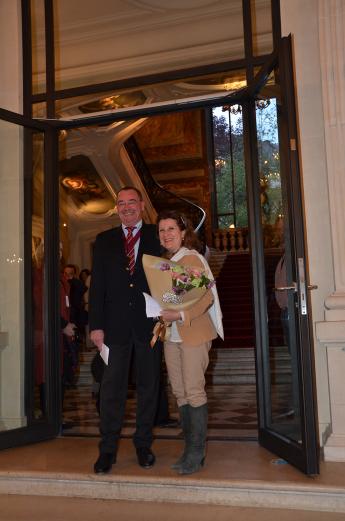News & Updates
41st ILAB Congress & 25th ILAB International Antiquarian Book Fair - Official Welcome by ILAB President Norbert Donhofer

From 13th to 16th April 2014 ILAB affiliates from all over the world gathered in Paris for the 41st ILAB Congress, preceded by the 25th ILAB International Antiquarian Book Fair and coinciding with the centenary of the Syndicat Français de la Librairie Ancienne et Moderne (SLAM). In his welcome speech ILAB President Norbert Donhofer traced the lines of SLAM's history, which is the second oldest antiquarian booksellers' association worldwide and one of the biggest and most influential organizations of the rare book trade.
Dear Anne, dear Presidents, Presidents of Honor, Treasurer of Honor, Members of Honor, colleagues and friends,
Welcome to Paris, welcome to the Salon France-Amériques, and welcome to the 100th anniversary of the SLAM which coincides with the 41st ILAB-Congress.
During today’s General Meeting, I had the honor of being elected as the new ILAB President, succeeding my friend Tom Congalton.
First of all, I wish to extend my thanks and gratitude to SLAM President Anne Lamort, to the SLAM Committee and in particular to Hervé Valentin and Anne-Marie Coulon who have been a great help in organizing this splendid Congress. Our next Congress in 2016, two years from now, will take us to Budapest in Hungary. Budapest is a lovely city - the Paris of the East -, I know that our friends from the Hungarian Association are preparing a wonderful event for us, and I hope you will be able to attend.
The year 1914 marked the outbreak of World War I and a tragedy of unimaginable degree whose end culminated in the dissolution of empires and the formation of new nations. At the same time, it also marked the end of a certain lifestyle which, however, not everybody had been able to take part in – the “Belle Époque”. And it was exactly in 1914, on the 23rd June, that is to say – only a few days before the assassination in Sarajevo which was to trigger the catastrophe of the First World War – that the first assembly of the SLAM took place. And it was not by chance, goodwill, or simple love of genial fellowship that SLAM’s founders decided on its inception. With the First World War, the quiet and peaceful years of commerce, in the true and noble sense of the word, one which knew nothing of scarcities, crises, and administrative burdens, came to an end, as René Cluzel stated in his “History of the SLAM”.
Who were the men who were convinced that only a professional association could help this line of business – that only an association could succeed in solving the increasingly complex problems where individuals were about to fail? The preparatory meeting consisted of 29 founding members, and at the inauguration of the association 44 members were greeted by the first president, Edouard Rahir, at a banquet in the Palais d’Orsay at the beginning of July. This was the start of a success story: in 1924 the number of members grew to 231, in 1928 to 315, and under the presidency of Fernand de Nobele in 1951, to 412. Early on, on 15th January 1920, the first issue of the “Bouquiniste Francais” was published – on the one hand, as an informative medium for the members, on the other hand, to attract more attention, and thirdly, to emulate the successful example of “The Clique” in England and an organ in Germany carrying important information which was even published daily.
How diverse the problems of this time were and how important the founding of SLAM was – which as an association had significantly more weight behind it than the individual booksellers. This is illustrated by a glimpse inside the “Bouquiniste”: topics included luxury tax, a complaint to the Under-Secretary for Post and Telegraphy about the long delivery times of catalogues (not much change here) and ranged to SLAM’s protest against the prohibition of the sale of a first edition of Baudelaire’s “Les Fleurs du mal” at a public auction. The early decades of SLAM saw the introduction of a ten percent discount for members of the association – this was later adopted by ILAB; the first brochures containing import/export regulations were published, a code of customs and good practice was laid down and sent not only to members but also to official state authorities, the export of books, documents and manuscripts classified as national treasures was discussed with official departments, lists of stolen books were published, and a definition of the term “original edition” was undertaken under the presidency of Maurice Escoffier.
At the same time, we can recognise that many problems abounded decades ago which we often think are of recent origin. Georges Puzin, the first non-Parisian president of SLAM, complained in 1936 of the high costs to professional booksellers impacting on their businesses, such as commissioning suitable book descriptions and delivering customer services, compared with amateurs, who were able to run their businesses at little expense – and I quote: “If this situation becomes the norm, the bookseller needs only shut up shop and turn to the telephone, a pen, a note-pad, the addresses of major customers, confidence and bluff – we are now seeing books sell at auction for higher prices than in the bookshops!” In other words, translated into today’s terms – all you would need is an iPad!
The Second World War and the occupation of France in 1940 brought serious cuts to the antiquarian book trade, which almost came to a standstill, and at the very least recorded a dramatic drop in sales, bringing many members of the SLAM into considerable difficulties. It is to the SLAM’s credit even today that the association refused to sign the so-called “Otto list” – a list of books which were opposed to Nazi ideology and therefore were banned, and it is also equally to the SLAM’s credit that the association endeavoured to protect Jewish members from expropriation. Finally, in the social sphere, the SLAM created an emergency fund supported by the members, of whom the great majority voluntarily subscribed. This surge in solidarity testified to the important role of SLAM in supporting its members in difficult circumstances, particularly in the aftermath of World War II.
Soon after the end of the war, SLAM was among the founding members of ILAB. In September 1947, Menno Hertzberger welcomed delegates from Denmark, Great Britain, Norway, Sweden and France to Amsterdam to discuss the foundation of an international association, which became a reality a short time later. It goes without saying that SLAM was able to look back on a plethora of experience since its own formation, and it did not hesitate to bring this experience to bear in the then young, International League of Antiquarian Booksellers (ILAB), even if other members did not always approve of it. However, and this I believe is important and must be stressed, the standards of the SLAM and its members are the highest in our profession, and it was therefore right that the SLAM insisted not only on setting high and even the highest ethical and moral standards, but also on anchoring them in the code of ethics of the ILAB. Fernand de Nobele, who, by the way, was crucially involved in the publication of “Usages and Customs” of ILAB, also recognized, as did Menno Hertzberger and William S. Kundig, that by establishing ILAB unifying factors were given ascendency over separative factors: “We no longer have to defend opposing interests, but common interests”. After two devastating wars and a bombed-out Europe, that was a courageous and forward-looking view.
Members of SLAM have served in a variety of positions on the ILAB committees. Georges Blaizot, Fernand de Nobele and Alain Nicolas were presidents of ILAB, and SLAM organized several conferences and meetings for ILAB. The SLAM is one of the first associations to have organized trade fairs – I hardly have to remind you of the marvellous events at the Conciergerie and the Mutualité, and now at the Grand Palais. SLAM organizes seminars and lectures, SLAM awards prizes for reference works – yes, there isn't actually anything in our profession that wasn’t invented by the SLAM!
On behalf of the whole of the ILAB, its member nations and affiliates, I wish SLAM a very happy 100th birthday and hope that SLAM will remain an active, always vital, future-oriented member of our international community for the next 100 years!
***
The speech was held at the 41st ILAB Congress in Paris from 13th to 16th April 2014. Presented here by permission of Norbert Donhofer.



